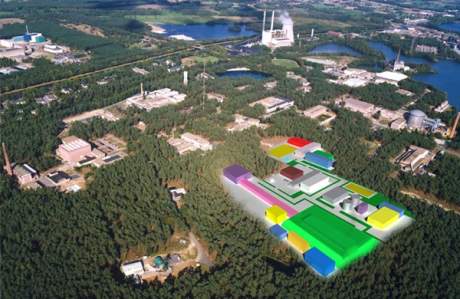Belgium's SCK-CEN has awarded a €24 million ($32 million) contract for front-end engineering design for the Myrrha accelerator-driven research reactor to a multinational consortium led by Areva.
 |
| How Myrrha is envisaged at SCK-CEN's Mol site (Image: SCK-CEN) |
The consortium of France's Areva TA, Italy's Ansaldo Nucleare and Spain's Empresarios Agrupados was chosen after a two-year selection procedure. As consortium leader, Areva TA is to receive over half of the total amount of the contract and will provide technical coordination and manage the overall nuclear design. Belgian company Grontmij will execute part of the tender as a sub-contractor to Areva.
The reactor and accelerator have been designed by SCK-CEN, but Myrrha project director Hamid Aït Abderrahim explained that the contract awarded to the consortium covers "everything that is not part of the SCK-CEN specialisations." It covers the technical design of all elements of the infrastructure of the first-of-a-kind plant, including buildings, cooling systems and instrumentation and control for the reactor and the particle accelerator. Its scope includes estimating the investment and operation costs for the reactor, validation of performance objectives, preparation for obtaining an operating licence and the definition of a detailed project schedule.
Myrrha - Multipurpose Hybrid Research Reactor for High-tech Applications - will be a 57 MWt accelerator-driven system (ADS) in which a proton accelerator will deliver a 600 MeV proton beam to a liquid lead-bismuth (Pb-Bi) spallation target that is in turn coupled to a Pb-Bi cooled subcritical fast nuclear core. It is intended to replace Belgium's ageing BR2 research reactor, and will be used in a range of research functions including the demonstration of the concept of transmutation of long-lived radionuclides in nuclear waste, as well as producing radioisotopes for medicine. The project forms part of the European Strategy Forum on Research Infrastructures (ESFRI), and is one of three new research reactors forming the cornerstones of the European Research Area of Experimental Reactors (ERAER), alongside the Jules Horowitz Reactor at Cadarache in France and the Pallas reactor at Petten in the Netherlands.
Myrrha is a true first-of-a-kind technological challenge: according to SCK-CEN, no infrastructure in existence offers comparable infrastructure to the design. This meant that initial selection of contractors was based on proven technological competence. Areva TA CEO Benoit Bazire described the contract as "recognition of our expertise in nuclear engineering and research reactor design".
Once the contract has been completed the project will be ready to begin construction, SCK-CEN says. Myrrha is expected to enter service in 2024-25.
Researched and written
by World Nuclear News






_15863.jpg)







